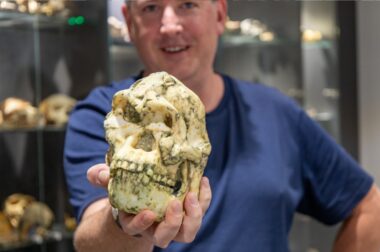La Trobe University fertility specialists hope the birth of more than 200 endangered Tasmanian Devil joeys at Zoos Victoria’s Healesville Sanctuary is a sign of more to come.
La Trobe and Zoos Victoria are collaborating on a landmark study working with specialist detection dogs to identify when female Tassie Devils are ready for mating, helping create successful pregnancies without human intervention.
The researchers hope their findings will help increase mating success using the non-invasive approach, and support conservation efforts of endangered species in captivity globally.
Tasmanian Devils are under the threat of extinction due to the deadly Devil Facial Tumour Disease (DFTD). Zoos Victoria is part of the Save the Tasmanian Devil Program (STDP). Healesville Sanctuary manages a breeding population of Tasmanian Devils as part of a long-term insurance program to ensure fitness, health and genetic diversity are maintained into the future. This year, the breeding program reached a major milestone with more than 200 joeys born at the bushland haven.
La Trobe Masters student and program researcher Hannah Roberts said: “We need better tools to figure out the correct time to pair devils in order to ensure successful outcomes. We need fast, cost-effective techniques that are also non-invasive.
“Our study has already found promising evidence that scent detection dogs can use odours in scat to determine when female Devils are ready to mate.”
The research team, including three La Trobe researchers and three Zoos Victoria researchers, has published a paper about the breeding research program in Frontiers in Veterinary Science.
The program worked with three Zoos Victoria Wildlife Detection Dogs to smell droppings collected from 11 sanctuary-bred female Devils during the breeding seasons of 2020 and 2021.
Dr Kerry Fanson, senior co-author, said by working with detection dogs they could ultimately improve breeding protocols, welfare and reproductive success for Tasmanian Devils.
“This program is an example of how non-invasive methods, such as specialist detection dogs, can support breeding programs for some of our most endangered species,” she said.
“With further research, this approach could also be expanded to breeding programs of other endangered species to improve conservation efforts worldwide.”
Zoos Victoria Wildlife Detection Dog Officer Dr La Toya Jamieson and senior co-author said dogs are incredible partners in our conservation work.
“This is an exciting new approach for working with detection dogs to directly assist with conservation breeding programs and we are hopeful this will be a beneficial method in the future.”
Scent detection dogs as a novel method for oestrus detection in an endangered species, the Tasmanian devil (Sarcophilus harrisii). doi: 10.3389/fvets.2023.1224172
Dr Fanson is available for interview: 0405 439 780
Media enquiries
Robyn Grace
0420 826 595


